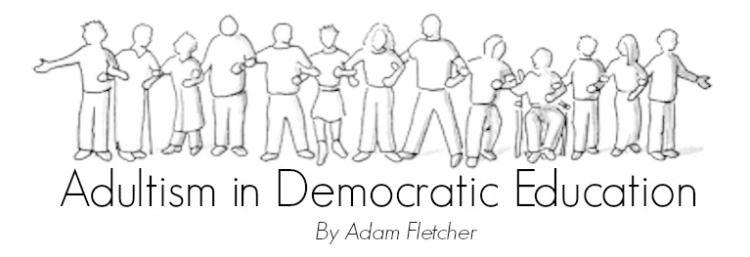Adultism In Democratic Education
 Goals, teaching styles, rules, curriculum, budgeting, building design, behavior expectations… All of these things are determined by adults, for students, throughout schools and nonprofits. Even in well-meaning democratic learning environments, adultism often runs rampant and unchecked. Like the wildly fast undercurrent of a river that looks slow and smooth on the surface, adultism is deep throughout work done by adults for children and youth.
Goals, teaching styles, rules, curriculum, budgeting, building design, behavior expectations… All of these things are determined by adults, for students, throughout schools and nonprofits. Even in well-meaning democratic learning environments, adultism often runs rampant and unchecked. Like the wildly fast undercurrent of a river that looks slow and smooth on the surface, adultism is deep throughout work done by adults for children and youth.When they read this, some people will automatically dismiss it as an attempt to cast aspersions on their work. I don’t mean to demonize anyone. Instead, I want us to simply acknowledge the basis from which so much of this work operates, including democratic education in all its myriad forms.
As the natural world around us routinely reflects, young people are not born with the capability to operate in the world around them. However, every child and youth has the capacity to live by their own terms. The dilemma is that well-meaning adults throughout our field seem to mix up these two words, capability and capacity. They assume young people are capable of leading themselves whenever, wherever, and however they want to, without working to intentionally increase the capacity of young people to do this. This is a deep expression of adultism, whereupon adults assume that young people have the same capability as them simply because adults have the capacity to do it. This is an unjust assumption at best.
Where Adultism Surfaces in Democratic Education
Learning environments that isolate young people from “real world” interactions by creating isolated experiences where young people have the capability to do whatever they want in the name of learning are actually expressing the will of adults. In our society today, we are
